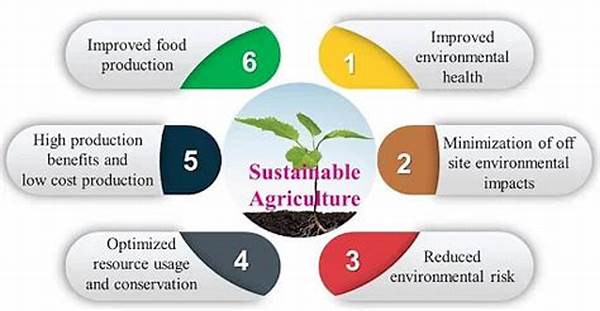In the realm of agriculture, the conversation often drifts towards the need for sustainability. This isn’t just trendy chatter; it’s a pressing need. Long-term agricultural sustainability benefits are pivotal for maintaining food security, environmental balance, and economic stability. Think of it as investing in the Earth’s future while reaping rewards in our lifetime. Let’s dive into how sustainable farming practices aren’t just paying off today but setting the stage for a brighter tomorrow.
Read Now : Fun Pastry Projects For Kids
Reaping What We Sow
Diving headlong into sustainable agriculture offers a plethora of boons that echo through generations. It’s not merely a method; it’s a revolution in how we perceive productivity and conservation. By emphasizing crop rotation, permaculture design, and reduced dependence on chemical fertilizers, farmers are getting the upper hand. The long-term agricultural sustainability benefits encapsulate a healthier environment, revitalized soils, and bolstered biodiversity. Plus, there’s a heavy emphasis on mixing up the game with things like crop diversity and integrated pest management. This holistic approach ensures that farms are acting like nature sanctuaries and production powerhouses at the same time.
It’s like farming with a conscious hip twist. Picture this: less pesticide means more bees, which means better pollination and bigger yields. And don’t get started on how these practices nix soil erosion and spur water conservation. When your soil’s alive and kicking, plants grow strong and healthier, reducing the need for artificial aids. All these things add up, generating long-term agricultural sustainability benefits, which is like getting smarter about eating healthy but for Mother Nature.
When sustainability pays off, everybody celebrates. Beyond the planet getting a breather, farmers see profits soaring from reduced input costs and niche markets craving organic and sustainably sourced produce. It’s a win-win for farmers smiling all the way to the bank and consumers who enjoy fresh, chemical-free goodies. Ultimately, this approach makes farming future-proof, allowing for resilience against climate hiccups, market swings, and ensuring long-term agricultural sustainability benefits that keep the wheels turning smoothly.
Score Big with Sustainability Practices
1. Sustainability ain’t just a fad; it’s the future. The long-term agricultural sustainability benefits include healthier soils that stick around longer, like the gift that keeps on giving.
2. Jump on the eco-train! Reduced chemical use means saving cash and safeguarding the land, while the long-term agricultural sustainability benefits surge up like a wave.
3. Biodiversity is benevolent! With diverse crops, farmers celebrate resilience, as long-term agricultural sustainability benefits make nature dance in harmony.
4. Water conservation wins! Adopting sustainability chops saves precious water, packaging long-term agricultural sustainability benefits that cascade through generations.
5. Climate proof your patch! Sustainable practices bolster weather defenses, making sure those long-term agricultural sustainability benefits are as steady as a rock.
The Green and Groovy Path Forward
Let’s get real; sustainable farming isn’t just a lousy trend but a hardcore commitment to transforming our food systems. The long-term agricultural sustainability benefits are massive. Practices like companion planting and agroforestry introduce variety into the landscape, replenishing ecosystems with levels of lushness and vigor. These green deeds reduce greenhouse gas emissions, boasting the agriculture sector’s ability to be a significant player in carbon reduction efforts. Farmers who take this approach find themselves aligned with nature’s rhythms, honing in on the conservation of energy and resources.
Our relationship with the Earth must evolve from extraction to coexistence. Sustainable agriculture isn’t merely about using less or using different; it’s about thinking long-term. By adopting practices that keep future generations in view, we’re planting seeds not just for crops, but for a paradigm shift. The long-term agricultural sustainability benefits are thus enshrined in today’s regenerative efforts as building blocks for a sustainable global food network.
Keeping It Real with Sustainable Strategies
In our fast-paced world, the simplicity of eco-friendly farming can be seductive. The appeal lies in the promise of long-term agricultural sustainability benefits, captivating with its transparency and resilience. It’s like taking a chill pill from the hustle, knowing every action contributes to a larger legacy for the generations waiting in the wings. Here are some sustainable strategies bringing new life to agriculture:
1. Biodiverse Cropping: Infusing fields with a cocktail of crops spells out resilience, as each species bolsters the environment in its unique way.
2. Permaculture Premier: More than a technique, this philosophy cultivates harmony in farming, leading to balance and sustainability.
3. Regenerative Revelations: Revitalizing worn-out soils with cover crops and smart grazing, steering agriculture back on track with a solid foundation.
Read Now : Exclusive Wine Tasting Tuscany
4. Water Wise Practices: Using smart irrigation and drought-resistant crops, farmers ensure that every drop counts, minimizing wasteful runoff and maximizing plant uptake.
5. Energy Efficiency Edits: Cutting emissions with renewable resources and precision farming tools, driving significant reductions in the carbon footprint.
6. Eco-Education: Crafting a new generation of environmentally aware farmers through hands-on learning and community sharing of sustainable farming practices.
7. Soil Health Boosting: Regular soil testing, organic composting, and reduced tillage work wonders to revive microbiomes and enhance fertility.
8. No Waste Mantra: Champions in zero waste, farmers transform leftovers into golden feed or compost materials.
9. Farmer Collaborations: Sharing knowledge and techniques across borders brings forth a collective wisdom that sustains and innovates.
10. Consumer Connection: Boasting farm-to-table initiatives that give consumers a taste of genuine sustainability.
Cultivating Future Generations
Picture this: fields humming with life, each inch of land optimized for a symbiotic existence with nature’s rhythms, each plant, insect, and microbe playing a role in harmony with the world. This isn’t a fairy tale but the reality long-term agricultural sustainability benefits promise us. As we lean into the future, the vitality of our agriculture system hinges not just on how much land we can cultivate but on how effectively we can sustain and nurture it.
More than just growing crops, sustainable practices reshape how we interact with our world. Be it through harnessing solar energy, composting excess, or switching to more efficient water systems, the changes are invigorating and necessary. Farmers working sustainably often exude a deep understanding of and connection to their environment. These efforts contribute to a robust agricultural framework that doesn’t buckle with market fluctuations or climate adversity. Instead, it grooves with them.
Across the globe, communities are rallying around these sustainable practices not just because they’re the old-new trendy thing but because they encapsulate a vision where humans and nature thrive. It’s a tapestry woven with the lessons of mindful agriculture, where the present reaps benefits as bountiful as the promise of the long-term agricultural sustainability benefits awaiting future generations. By investing thoughtfully in our agro-ecosystems, we’re not merely planting seeds for sustainable produce but for a nourished planet.
Harmonizing with Nature
In pursuit of these long-term agricultural sustainability benefits, there’s a return to roots – quite literally. By understanding ancient practices and marrying them with modern technology, farmers craft a robust response to the swift changes our world demands. There’s a resurging recognition of the delicate balancing act that is necessary to till the land without taking away its intrinsic vigor.
Farmers today are the stewards of tomorrow’s landscape. Implementing sustainable practices means honoring the land, recognizing its limits, and expanding its potential. Agricultural innovations work best when they consider those who call these fields home. In doing so, these practices enable a future where the agriculture sector can contribute positively rather than being a drain on resources. With long-term agricultural sustainability benefits, the stories of successful transitions will continue to inspire shifts in policy and practice, helping to cement regenerative agriculture as the linchpin of future prosperity.



